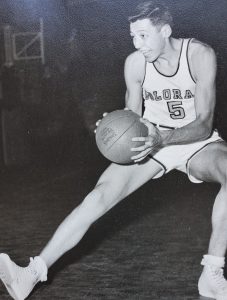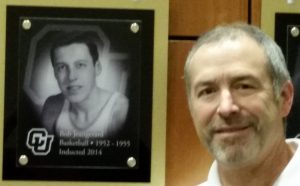The NBA Finals date back to 1947 (when they were known as the Basketball Association of America Finals) and the very 1st NCAA tourney was held in 1939. Olympic basketball competition is even older: it debuted as a demonstration event in 1904 and the men’s version became a medal sport in 1936, with the women finally getting their chance to go for the gold in 1976. The United States has dominated Olympic basketball competition from the start: the men have won 15 gold medals in the 18 tournaments they have participated in during the past 84 years, while the women have won 8 gold medals in the 10 tournaments in which they have competed during the past 44 years. Those of you who were looking forward to the 2020 Olympics opening ceremonies in Tokyo on July 24, 2020 will have to wait an extra 364 days, as the coronavirus caused a postponement until July 23, 2021. Due to the absence of college basketball since mid-March, HoopsHD’s Jon Teitel decided to fill the void by trying to interview as many prior Olympic players/coaches as possible so that you have something to read this summer while not watching the Summer Games. We continue our coverage by chatting with Bob Jeangerard about his father Robert winning a gold medal in 1956. Today marks the 6th anniversary of Robert’s passing in 2014 so we send our condolences to his entire family.
Your father was born/raised in Illinois: what made him choose Colorado? He went to New Trier High School and his best sport was actually baseball. He grew up poor and got great grades but he was not highly recruited for baseball. Colorado offered him a basketball scholarship and he was very proud to take it.
1 of his college teammates was Burdie Haldorson, who later became his Olympic teammate: what kind of relationship did they have? They were the best of friends: when my dad passed I talked to Burdie on the phone about it.
In a 1954 game against Nebraska he made a 45-foot hook shot from half-court at the end of the 1st half, and when asked how he did it he said, “It is simple: we have a drill for that play and I work on it 15 minutes every night”: how much of his success was based on his work ethic? I had never heard about that story until after he passed. There was nobody who had a higher work ethic in his life and sports was no different. My son Justin kept going to his grandfather and asking him how he could improve his own basketball skills. My dad wrote out a list of everything that Justin would have to do if he was serious: it involved an insane amount of shots and putting his mind into it as well. Even if my dad was not talented in certain areas he achieved success both on and off the court by setting out his goals for getting there.
In the 1955 Final 4 he scored 4 PTS in a loss to eventual champ San Francisco (tourney MOP Bill Russell scored 24 PTS/10-14 FG): how close did he come to winning a title against Russell, and how did he like playing with Russell the following year? He said that San Francisco was in a whole other league with Russell/KC Jones and that they just ran into 1 of the best college teams ever. He had great stories about Bill and loved everything about him: the entire team was close during the Olympics and they all became the best men at his wedding after they returned to the US! They traveled throughout the South before the Olympics and would sometimes run into situations where a restaurant would not serve Russell due to a racial divide. My dad always told us about how bad things were and what great men Bill/KC were to rise above that while educating the rest of the team.
After college he played for the Phillips 66ers in the National Industrial Basketball League, and after winning the Olympic Trials in 1956 he was 1 of 5 players from the 66ers selected for the Olympic team: how did he feel about making the roster for team USA? He was as proud as could be and extraordinarily excited. The 66ers were the underdogs but persevered.
He scored a team-high 16 PTS in a win over the Soviet Union in the gold medal game: what did it mean to him to represent his country, and what did it mean to him to win a gold medal? His obituary mentioned that he had won a gold medal: some of his friends were stunned to read that because he was so unassuming and never bragged about it. He was very proud of his accomplishments and I know that he loved that entire team. They had some superstars but they made it a team game and were dominant. They had a huge scoring margin (53.5 PPG) but did not have the flash. He did not like when the Dream Team started using pro players: he wished that team USA could have remained a college team.
After returning from the Olympics he became a pilot in the Air Force: what impact did his service have on him either on or off the court? He had a commitment to honor after getting married before the Olympics. I do not think that he saw any combat but he was very proud to serve his country. He was always goal-oriented until the very end: even when he was ill he tried to make everyone happy. He was a big fan of writing down his goals and then adding to/subtracting from them. The non-superstars in the NBA did not make a lot of money and it was not 1 of his goals.
He won another gold medal with team USA at the 1959 Pan Am Games in Chicago: how did he like playing with a pair of legends in Oscar Robertson/Jerry West? Similar to playing with Bill/KC, he talked at length about how honored he was to play with Oscar/Jerry. He said that Jerry was 1 of the nicest human beings he ever met. My dad was obviously not in their league but appreciated what they brought to the team. He is very proud of his Chicago roots and I know that it must have been extra-special for him to win a gold medal there.
After retiring from basketball he started his own chain of tire stores, then became a lawyer for his stores, and started a foundation to raise money for national parks: how was he able to have so much off-court success after having so much on-court success? He and his brothers came up with a business plan to start a tire company in the Bay Area. He went to law school on nights/weekends and became an attorney while running a business and being a great father/husband. He was 1 of those guys who set some lofty goals and accomplished them all: it was pretty unbelievable! He did not like to talk about himself unless it would help the lives of others.
He passed away in 2014: when people look back on his career, how do you think that he should be remembered the most? I believe they would call him the ultimate team guy. He had a great work ethic and was huge on practice. He was no-nonsense and made everyone else around him better.




